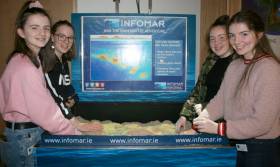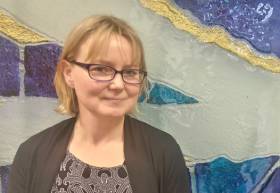Displaying items by tag: STEM
TY Students Dive Into Science At Marine Institute’s HQ
Last week the Marine Institute’s headquarters in Oranmore, Co Galway welcomed 22 Transition year students to its fifth annual TY training week.
Students from Galway, Mayo, Clare, Roscommon, Dublin and Waterford engaged in a range of STEM-related activities to experience what it is like to work in the marine sector.
The TY students shadowed scientists and staff at the Marine Institute, learning about marine science, technology and asasociated disciplines.
They also engaged in a range of presentations and interactive activities related to fisheries science, marine chemistry, seabed mapping, food safety, research vessel operations, maritime development, oceanography and marine climate, data, applications development, team-building and communications.
“Increasing students’ knowledge on the importance of our marine resource, is key to supporting Ireland's ocean economy, where highly skilled professionals are needed in the future,” said Marine Institute chief executive Dr Peter Heffernan.
“Our TY Week programme aims to inspire a new generation of marine professionals, and provides an insight into the diverse career opportunities on offer in Ireland’s marine sector.”
TY students from any school in Ireland are welcome to apply for this week-long, full-time work experience opportunity at the Marine Institute for 2020. Further details on the application process will be available later this year.
Scientists Urge Women & Girls To Follow Their Passion For STEM
#MarineScience - Today, Sunday 11 February, Inland Fisheries Ireland (IFI) is marking International Day of Women and Girls in Science by highlighting the key role that women play in the organisation.
According to UN Secretary-General António Guterres: “We need to encourage and support girls and women achieve their full potential as scientific researchers and innovators.”
As an organisation, IFI carries out scientific fisheries research, monitoring and investigations which aim to manage, improve and protect the inland fisheries resource.
A board member of IFI, Dr Frances Lucy is also chair of the Environmental Sciences Association of Ireland. She is head of the Department of Environmental Science and director of the Centre for Environmental Research Innovation and Sustainability at the Institute of Technology, Sligo.
“My advice to young girls and women interested in science is this: follow your passion, let no-one discourage you,” she says.
“It is harder for women, though, because women face the challenge of trying to balance career, children and family. Never underestimate yourself.
“Science is a wonderful discipline and is very rewarding. It’s a career in its own right, but it also offers encouragement to others and makes an impact on science and on society.”
IFI staff member Dr Fiona Kelly is a senior research officer. Dr Kelly heads up a large team specialising in research on various freshwater fish species and has been interested in science since she was a child.
Growing up in Kildare and then Kilkenny, beside the Rivers Liffey and Barrow, her father nurtured her interest in nature, leading to her being an exhibitor at the annual Young Scientist Expo in Dublin’s RDS, before going on to earn a BSc (Hons) in zoology and a PhD in freshwater ecology at University College Dublin.
“As a career, science is extremely interesting and rewarding. The work we do in Inland Fisheries Ireland has great variety and diversity,” she explains. “It’s not just a desk job, you get to work outdoors on rivers, lakes and estuaries on a regular basis.
“For example, I am currently leading the team who carry out the fish monitoring for the Water Framework Directive, to assess the status of fish stocks across the country.”
Dr Kelly says Irish women scientists in the environmental and fisheries sector are well regarded.
“As an island nation, we have a different perspective, so we have much to offer. For instance, I’m on the EIFAAC Technical and Scientific Committee, a sub-committee working under the aegis of the Food and Agriculture Organisation of the United Nations. Irish scientists, male and female, are regular speakers at international conferences.
“It’s a varied and exciting career I would encourage any girls and women who are interested in science to pursue it as a career.”
Wise words of advice as we celebrate UN International Day of Women and Girls in Science.






























































